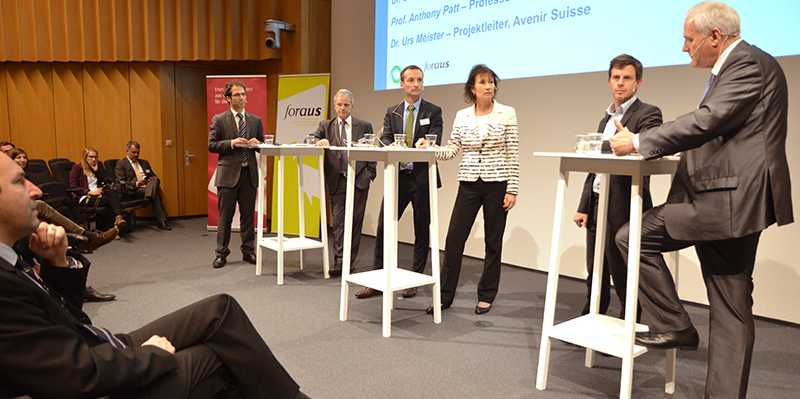Switzerland must remain integrated in the electricity market
The energy supply in Switzerland in the year 2050 was the focus of a conference organised by ETH Zurich's Energy Science Centre (ESC). One thing was very clear: as far as electricity is concerned, no man is an island any longer.
The Federal Council's 2050 energy strategy sets out various solutions for meeting Switzerland's electricity demands if the local nuclear power stations were to be decommissioned. The various scenarios revolve around whether Switzerland will, in future, be able to meet demand for electricity primarily through increased domestic production or whether it should further integrate itself into a European grid system.
On the basis of this debate, ETH Zurich's Energy Science Centre (ESC) held a workshop and two podiums titled "2050 energy supply: challenges and potential solutions" last Thursday in collaboration with the think tank foraus - Forum Aussenpolitik. The aim of the event was to contribute to the public debate on the Swiss electricity and energy strategy in an international context.
Little economic or ecological sense
In the first part of the event, experts identified the issues currently at the heart of the energy debate. Sebastian Rausch, assistant professor for economy and energy management at ETH Zurich, explained the effects that a policy of isolation from or integration in the European electricity market would have for Switzerland. He drew attention to Switzerland's brisk electricity trade with other European countries, primarily Germany, Italy and France.
"International electricity trade enables resources to be used more efficiently, especially in light of the planned huge expansion of the renewable energy industry," said the economist. Rausch argued that the international electricity market has a major role to play in Switzerland's future: grid expansion in Europe would mean significant economic losses for the country if Switzerland were not to integrate itself into the European electricity market, a move that would have a positive effect on its economy.
Anthony Patt, professor for human-environment systems at ETH, raised the issue of whether the security of supply could be achieved through self-sufficiency. "Self-sufficiency is an attractive proposition. Many Swiss residents want to be energy-independent," he said. He added that Switzerland is currently integrated into the European electricity market, with the energy supply controlled centrally. This makes Switzerland dependent on imports, he said. Were Switzerland to become self-sufficient and decommission its nuclear plants, it would need an additional 5,000 wind turbines or 66 km2 of photovoltaic surfaces by 2070. This would cover the 24 TWh gap in demand. "Theoretically we could become energy independent," said Patt, "but it's not realistic."
The ETH professor and environmental scientist believes Switzerland's energy future will be to integrate with the international electricity market, though this should be a CO2-neutral move. According to his calculations, solar-thermal power plants in sunny regions could be connected to the European – and Swiss – electricity grid via high-voltage DC transmission lines. This could cover a large proportion of Swiss and European electricity demand. It is a reliable source available at all times. (see ETH news from 22 June 2014)
Self-sufficiency would have several disadvantages for Switzerland, he argued. The need for more domestic power lines and a generation capacity that would be poorly utilised would cause more environmental harm and lower reliability of supply, and these factors would combine to increase grid complexity. Water and pumped-storage power plants would have to be much more flexible, which would negatively impact inshore waters. Finally, international grids would receive less Swiss hydropower, leading to a detrimental effect on the environment as this source of energy has one of the lowest levels of CO2 emissions. "It would also be difficult from a political point of view not to be dependent on imports," said Patt.
Continued network expansion
In the third talk, senior lecturer Andreas Ulbig from the Power Systems and High Voltage Laboratories described how Europe has developed its electricity grid over the past 40 years. The supply grid has become more and more close-meshed. North Africa and Turkey are now also linked to the European network. The trend, he observed, is to transport electricity through high-voltage DC transmission lines across ever-greater distances from the point of generation to the site of consumption, and, in doing so, to further expand the grid in order to accommodate this.
Furthermore, in the past few years, increasingly higher capacities have been added to the mix in the form of renewable energy sources, which require a high level of flexibility due to their contingent, non-consistent generation process. In the meantime, wind turbine capacities able to generate 150 TWh and solar energy facilities amounting to 45 TWh have been installed across Europe. This alters the load flow in and around Switzerland. Ulbig used model calculations to show that Switzerland would suffer a severely reduced role as a transit country by 2050 if it were to isolate itself from the rest of Europe. This could result in the load along the Swiss-Italian grid section being reduced to half its present level (almost 100% load during the summer).
High-level podiums
Two podiums comprising high-level experts from research, economy and German, Austrian and Swiss ministries discussed how Switzerland can be included in the European electricity market despite not being an EU member state. They also considered the challenges of integrating renewable energy sources such as photovoltaics and wind energy into the electricity sector, and the future role to be played by hydropower and pumped storage as a means of storing production surpluses generated by wind turbines and solar power plants.
The first podium was made up of Urban Rid, Head of Energy at the German Federal Ministry for Economic Affairs and Energy, Christian Schönbauer from the Austrian Federal Ministry of Science, Research and Economy, Martin Näf, Corporate Research at ABB Schweiz, and Walter Steinmann, Director of the Swiss Federal Office of Energy. The second podium consisted of Walter Steinmann, economist Urs Meister from Avenir Suisse, Anthony Patt and Suzanne Thoma, CEO of BKW AG. The talks were moderated by NZZ editor Davide Scruzzi.
Self-sufficiency in electricity generation is unrealistic
The podiums agreed that in political and economic terms the general conditions of the electricity market and the operation of the grid are constantly changing. Expansion of wind and solar energy capacities in Europe is advancing rapidly, which requires increasing technological flexibility to ensure that consumers are reliably supplied with electricity around the clock. However, this has led to a capacity surplus, causing a plunge in electricity prices, much to the chagrin of major energy companies, which have no interest in investing at present. Completing the revolution in energy provision, however, requires investments in the conversion of the systems and the expansion of the largely CO2-neutral hydropower plants.
There are increasing worries about energy self-sufficiency and political isolation of Switzerland from the rest of Europe. This is an island situation that neither side is keen to support. In this regard, the podiums broadly agreed that a policy of self-sufficiency in Switzerland is not an option, and that in the long term only integration of the electricity market and grid can guarantee supply. Or, as it was pointed out during the discussion, "Electrons don't just stop at national borders."
ETH's Zukunftsblog liveblogged the event: external pagehttp://twitter.com/ETHZukunftsblogcall_made. Tweets can be viewed with #energieversorgung2050.
Photo gallery ESC event "Energieversorgung 2050: Intergration oder Inseldenken?"
-
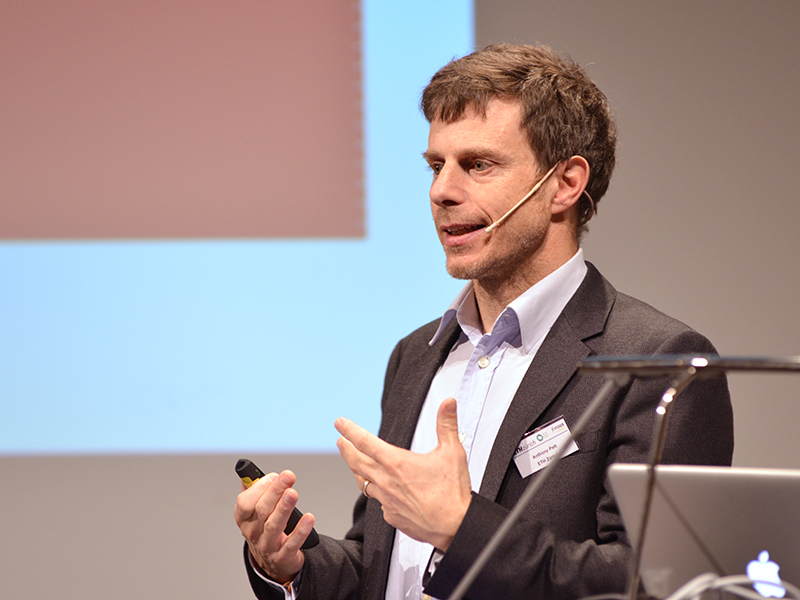
Anthony Patt, professor of human-environment systems at D-USYS. (All photos: ETH Zürich/Peter Rüegg) -
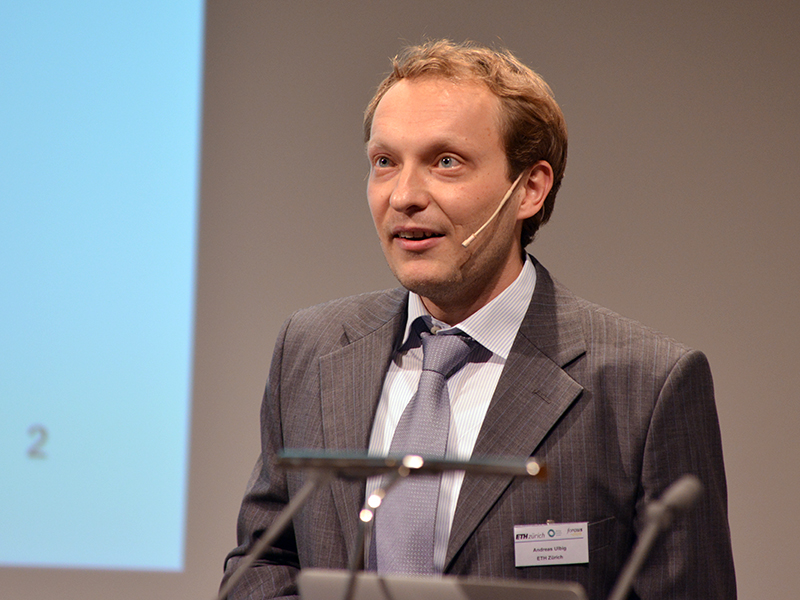
Power grid expert: Andreas Ulbig, senior scientist at D-ITET. -
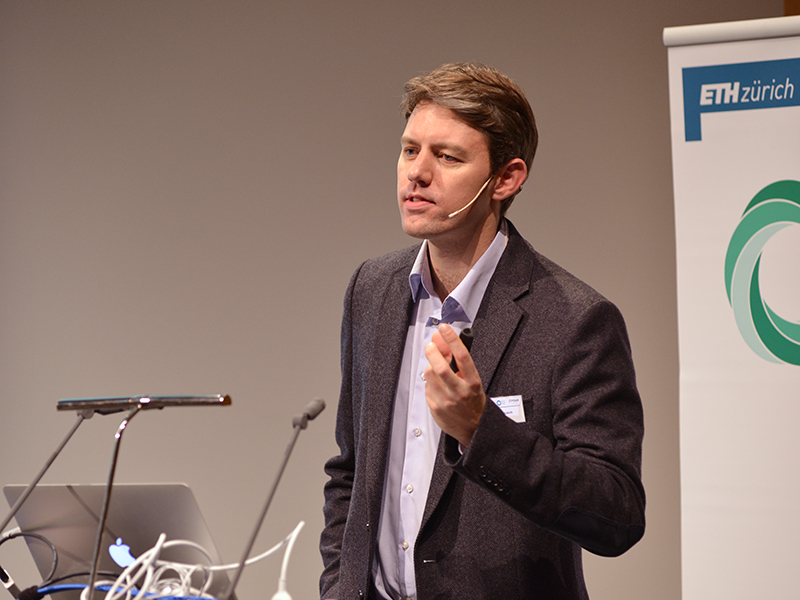
Sebastian Rausch, assistant professor at D-MTEC. -
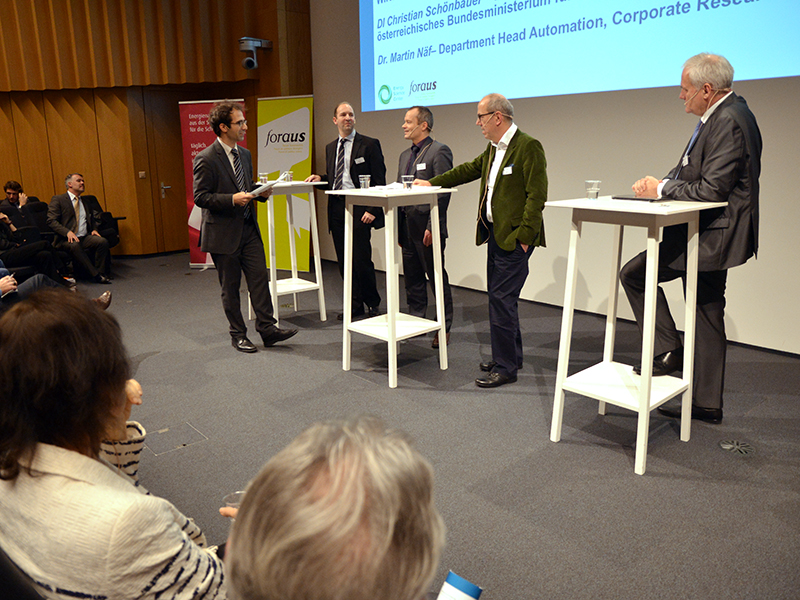
Podium with Davide Scruzzi (left), Martin Näf, Christian Schönbauer, Urban Rid and Walter Steinmann (from left to right).

